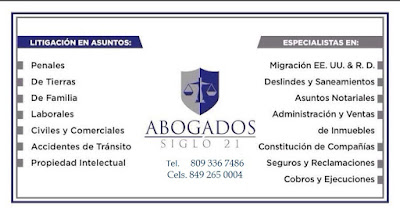 |
| Dominican lawyers |
IMPOSSIBILITY AFTER SANITATION AND PERIOD FOR REVIEW
Jurisprudence has established that the inclusion of heirs is not possible after the property has been sanitized and the one-year period for review has expired. The rights that have not been invoked in the sanitation process are annihilated by the sentence that puts an end to it, SCJ. 3rd. Cam., July 25, 2007.
GOOD FAITH PURCHASER
It has also established that an acquirer in good faith and for valuable consideration cannot be harmed by a litigation involving heirs that is subsequent to the registration of their rights. Said litis is not opposable, SCJ, 3rd. Cam., April 22, 2009.
IT DOES NOT PROCEED IN CASSATION ON A SUBSTANTIVE QUESTION
Similarly, the criterion has been established that the voluntary intervention made in cassation on a substantive issue (inclusion in determining heirs) is inadmissible, which must have been done before the judges of the fund or before the competent commissioner judge to settle all the questions or answers related to the division of assets, SCJ, 1st Chamber, December 14, 2011. But it has stated that the lawsuit including heirs does not prescribe if the real estate is still part of the estate, SCJ, 3 .a Chamber, May 23, 2012. And that the litis in inclusion of heirs is opposable to purchasers in good faith who have not registered their rights, SCJ, 1st Chamber July 17, 2013.
TRANSFER TO A THIRD GOOD FAITH ACQUIRER AND ONEROUS TITLE
It is good to point out that although the action to claim a succession is imprescriptible, this is only possible when the property is still in the estate of the deceased or his successors, but not when they have been transferred to a third party purchaser in good faith and for valuable consideration. , SCJ, 3rd Chamber, December 27, 2013.
The action to challenge an act of sale of registered land prescribes after twenty years, even if those who invoke the nullity are heirs supposedly excluded from the succession that made the sale. SCJ, 3rd Chamber, March 20, 2013. A decision in determination of heirs does not have res judicata authority with respect to a lawsuit in inclusion of heirs filed by a person who did not appear as a party in the determination, SCJ, 3 .a Room, December 27, 2013.
TERM OF TWENTY YEARS TO CHALLENGE AN ACT OF SALE OF REGISTERED LAND
The action to challenge an act of sale of registered land prescribes after twenty years, even if those who invoke the nullity are heirs supposedly excluded from the succession that made the sale. SCJ, 3rd Chamber, March 20, 2013. A decision in determination of heirs does not have res judicata authority with respect to a lawsuit in inclusion of heirs filed by a person who did not appear as a party in the determination, SCJ, 3 .a Room, December 27, 2013.
Although the Certificate of Title must be a document that is sufficient in itself and the person who acquires the property in view of that document, free of annotations and encumbrances, must be considered a third party purchaser in good faith, this always means that the Certificate of Title that is shown to you is legitimate and not the result of maneuvers to dispossess a co-owner of the part that corresponds to him in the property, which is not the case when the Certificate of Title was despite the claim of a co-heir of his inclusion in his father's succession, claim that had been registered in the Registry of Titles before the purchase of the land by the third party, SCJ, 3.a Cám., July 20, 2005.






.jpg)
.jpg)

